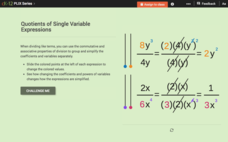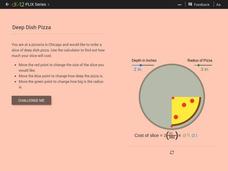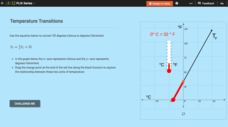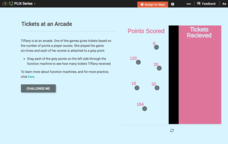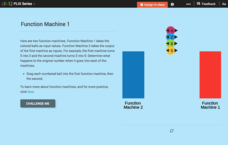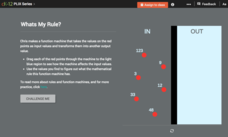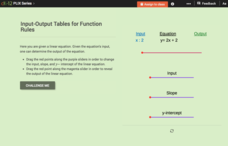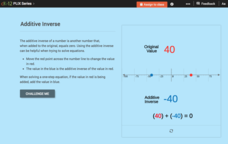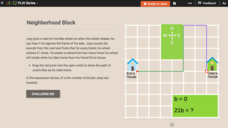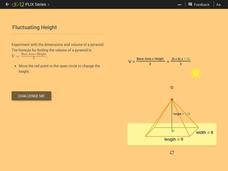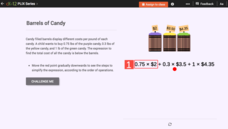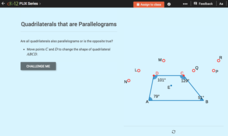CK-12 Foundation
Simplify Variable Expressions Involving Integer Addition
Ensure your classes aren't drowning in expressions. An interactive simulation has scholars change the depth of a fish based on the coefficient of terms. As they add the terms together, the fish bobs up and down until reaching the answer.
CK-12 Foundation
Simplify Sums or Differences of Single Variable Expressions: Addition and Subtraction of Like Terms
Investigate the process of combining like terms using an interactive animation. Scholars tackle simplifying expressions by manipulating rectangles that represent the terms. They add and subtract terms to arrive at the result.
CK-12 Foundation
Simplify Products or Quotients of Single Variable Expressions: Circling C's
Model expression division using online manipulatives. Learners drag C's representing a term into equal groups. Guiding questions help them see their groups as the division of the term.
CK-12 Foundation
Simplify Products or Quotients of Single Variable Expressions: Quotients of Single Variable Expressions
Investigate division within an algebraic term using an inquiry-based lesson. Individuals adjust sliders and watch as the simplification of the term changes. Questions help guide them to important conclusions.
CK-12 Foundation
Linear Equations: Deep Dish Pizza
Explore the volume of solids with a real-life connection. Learners calculate the volume of a deep-dish slice of pizza to determine its price. They model the slice as a part of a cylinder and create a formula for calculating the cost.
CK-12 Foundation
Linear Equations: Temperature Transitions
Explore linear conversions using an engaging interactive lesson. Learners drag a point on a graph to discover the equivalent degrees in Fahrenheit and Celsius. Embedded questions highlight key features such as slope and the...
CK-12 Foundation
Function Rules for Input-Output Tables: Soda Sugar Function Table
Examine the relationship between the input and output variables in a table of values. As learners build an input-output table using online manipulatives, they begin to identify patterns. They answer questions about these patterns...
CK-12 Foundation
Function Rules for Input-Output Tables: Function Machine 2
Model function operations using a function machine. An interactive lesson has learners determine the patterns of a double function machine. They use the patterns to write functions and make connections between the inputs and outputs.
CK-12 Foundation
Function Rules for Input-Output Tables: Tickets at an Arcade
This is the ticket to learning about function rules! Using online manipulatives, scholars build a table of values and then answer questions about the related function. They examine the relationship between the input and output values and...
CK-12 Foundation
Function Rules for Input-Output Tables: Function Machine 1
Challenge your classes to find the pattern of a double function machine. After recording the outputs of both machines, learners identify the pattern and the corresponding function. Both patterns involve adding/subtracting a constant.
CK-12 Foundation
Function Rules for Input-Output Tables: Whats My Rule?
What's the rule that makes it true? A virtual function machine generates output values as learners submit the input values. Their job is to analyze the inputs and outputs for a pattern and write a function rule.
CK-12 Foundation
Function Rules for Input-Output Tables: Function Machine!
Watch as a function machine converts an input to an output. Learners determine the work applied by the function machine to write a function rule. Questions accompany the function machine animation to guide individuals to conclusions.
CK-12 Foundation
Input-Output Tables for Function Rules
How does changing a graph affect the function? Learners watch the changing input-output table as they adjust the location of the line graph. Questions prompt them to complete a table of values and determine the function rule.
CK-12 Foundation
Input-Output Tables for Function Rules
Make the abstract a bit more concrete with an interactive that asks learners to slide an input value through a function to determine the output. Changing the slope and y-intercept allows them to see the how the output values change.
CK-12 Foundation
One-Step Equations and Inverse Operations: Additive Inverse
Reinforce properties while solving equations. Learners often ignore properties even as they try to apply them. A well-designed lesson emphasizes the role of additive inverses when solving equations.
CK-12 Foundation
Absolute Value: Picket Fence Painting
Painting a fence can be useful for more than just making your yard look good. A slider interactive has young mathematicians adjust the number of white fence panels. This activity helps in understanding how absolute value equations...
CK-12 Foundation
Single Variable Expressions: Neighborhood Block
The number of bicycle wheel turns is as good as any way to describe the distance from school to home. An interactive lets young mathematicians determine the number of city blocks a person bicycles. They use this information along with an...
CK-12 Foundation
Volume of Pyramids: Fluctuating Height
The height of a pyramid may change, but the usefulness of the interactive will not. Learners drag the apex of a pyramid to change its height. They then answer a set of challenge questions designed to investigate how changing the...
CK-12 Foundation
Order of Operations: Barrels of Candy
We'd all love to have barrels of candy. An interactive shows the steps in evaluating a numerical expression that reflects the cost of buying several different barrels of candy.
CK-12 Foundation
Writing Basic Equations: Stars and Moons
You'll be over the moon about finding a useful resource for describing patterns. Aspiring mathematicians drag moon and star shapes to complete a shape pattern. Additionally, they must write an algebraic equation to describe the pattern.
CK-12 Foundation
Parallel and Skew Lines: Parallel or Not?
There's nothing askew about an informative resource. Pupils adjust one of two lines in an interactive to determine if the lines are parallel or skew. They answer a set of challenge questions about the lines.
CK-12 Foundation
Parallelogram Proofs: Quadrilaterals that are Parallelograms
What conditions must be met for a quadrilateral to be a parallelogram? A slider interactive allows individuals to move the vertices of a quadrilateral. They answer questions that prove whether a given quadrilateral is a parallelogram.
CK-12 Foundation
Order Real Numbers: Pie Baking Contest
Time is on your side. Scholars plot three points on number lines with different time units to represent the time it takes three people to bake pies. They determine the fastest baker and the difference in times between the bakers.
CK-12 Foundation
Inequalities that Describe Patterns: Freezing Cold Comparison
Don't freeze out the interactive on inequalities from your lesson plans. Young mathematicians use an interactive thermometer and number line to compare freezing temperatures. Inequalities help express these comparisons.





